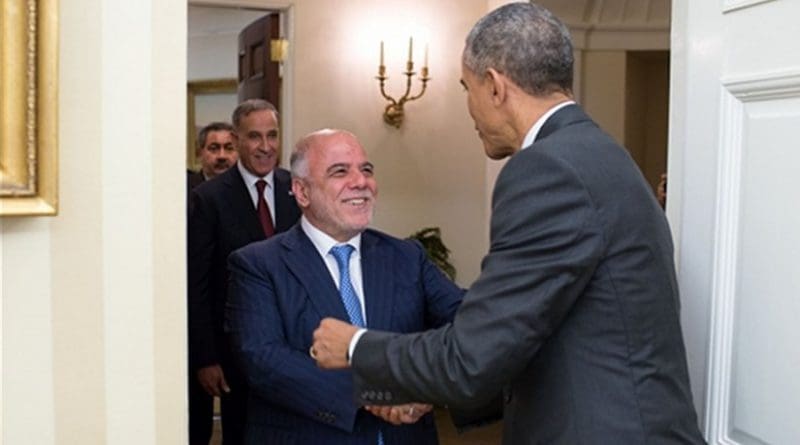Baghdad’s Reliance On Shi’ite Militias Raises Concerns Of A Hidden Agenda – Analysis
By INEGMA
By Riad Kahwaji*
The Iraqi government’s over-reliance on Shiite militias to do the job of the Iraqi military has raised eye-brows over Baghdad’s true intentions in the current war on terrorism and whether it has a hidden agenda with its strategic ally, Iran, to weaken and cleanse Sunni provinces and thereby reach oil-rich areas in the north.
The ease with which the forces of the Islamic State in Iraq and Syria (ISIS) advance into predominantly Sunni towns and cities with little if any significant resistance from the Iraqi regular troops or paramilitary police units has raised the suspicion of many observers and officials regionally and internationally.
What was more surprising to see was the Iraqi government seeking the assistance of Iranian-backed Iraqi Shiite militias under the banner of Popular Mobilization Forces (PMF) to do the job that the Iraqi Armed Forces should be doing.
According to defense contractors and Iraqi security sources Baghdad has been investing heavily in building the PMF. “The Iraqi government is transferring most of the procured ammunition and arms to the PMF and leaving Iraqi troops and police most of the time with limited ammunition and defense capabilities,” says one defense contractor who deals with Iraq, requesting not to be named.
“Once an arms shipment reaches the Baghdad airport we see Iraqi security giving way to PMF men to move in and unload the weapons on their own trucks and drive away… The Iraqi government is even providing legal documentations like end-user certificates to procure stuff for the PMF,” he adds. According to another Iraqi security official who asked not to be named, “between what ISIS captured from Iraqi Army depots and from what the government has given the PMF, the Iraqi military has lost around 65 percent of its arms, equipment and assets.”
The last city to be lost to ISIS was Ramadi, and it repeated the same scenario of what happened earlier at Tikrit and many other places. ISIS fighters would push in with Iraqi regular forces backed by some poorly armed Sunni tribesmen putting up a desperate fight with limited ammunition and resources. Pleas for assistance from Baghdad would go unanswered until the city is lost, and then the government would call out intervention from the PMF.
In Tikrit, the PMF failed to expel ISIS from the city and the International and Arab Coalition fighting ISIS initially refused to provide air cover for PMF for fear of being caught up in the sectarian tensions sweeping across Iraq. Tikrit was later liberated from ISIS by regular Iraqi troops with Coalition air cover. But PMF moved into the city shortly afterwards and was accused by the Human Rights Watch of committing atrocities against residents of the overwhelmingly Sunni-majority city. Iraqi Sunni officials called for public enquiries and the Iraqi government promised to investigate, but nothing has yet materialized. Many of the city’s residents remain unable to return for fear of reprisals by PMF militias roaming the city.
The same scenario appears to be unfolding in Ramadi now where a Shiite militia is being asked to move in to evict Sunni militants. The Arab members of the Coalition, especially the Arab Gulf States appear to have suspended all operations in Iraq. According to an official Arab Gulf source the United States, which leads the Coalition, was informed that the Arab warplanes will not be able to take part in any operations that provide air support to the PMF.
Worried about the unity of the Coalition, Washington adopted a similar position and has pressed Baghdad to invest more in building the regular forces and arming Sunni tribesmen to fight ISIS. While the Iraqi government has been very slow in reacting, the U.S. Congress has moved faster to pass a law allowing Washington to provide arms to Sunni and Kurdish forces in Iraq without going through Baghdad.
President Obama has also ordered additional US Army Advisors to train the Iraqi Armed Forces. However, the current policies of the Iranian-influenced Iraqi government seem to be heightening Sunni grievances and sectarian tensions because the war on ISIS is being used as a cover for sectarian targeting and as a means to widen Shi’ite control in oil-rich northern territories.
However, Baghdad is likely to soon find itself in direct conflict with neighboring Arab Gulf countries and even the West. Exasperating the anxieties of Iraqi Sunni population especially among the conservative tribes will push more of their young men into allying with ISIS and shifting the current war on terrorism into a sectarian conflict in Iraq once again.
The international community should exercise more scrutiny in its arms deals with Iraq and impose stricter conditions to monitor and penalize Baghdad for passing on weapons and ammunition to the militias. Turning the war on ISIS in Iraq into a sectarian conflict will ultimately escalate into a larger regional conflict at the expense of the war on terrorism, and devastate any regional stability and security.
*Riad Kahwaji, CEO, INEGMA

